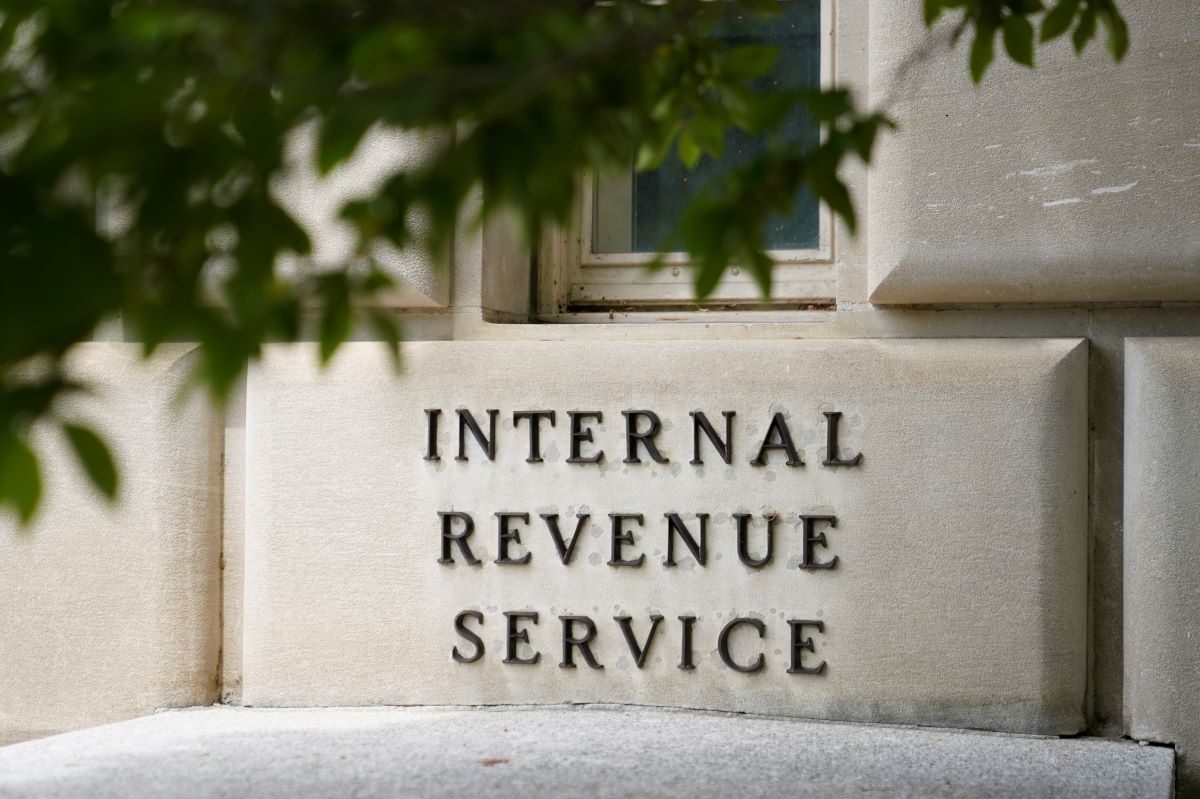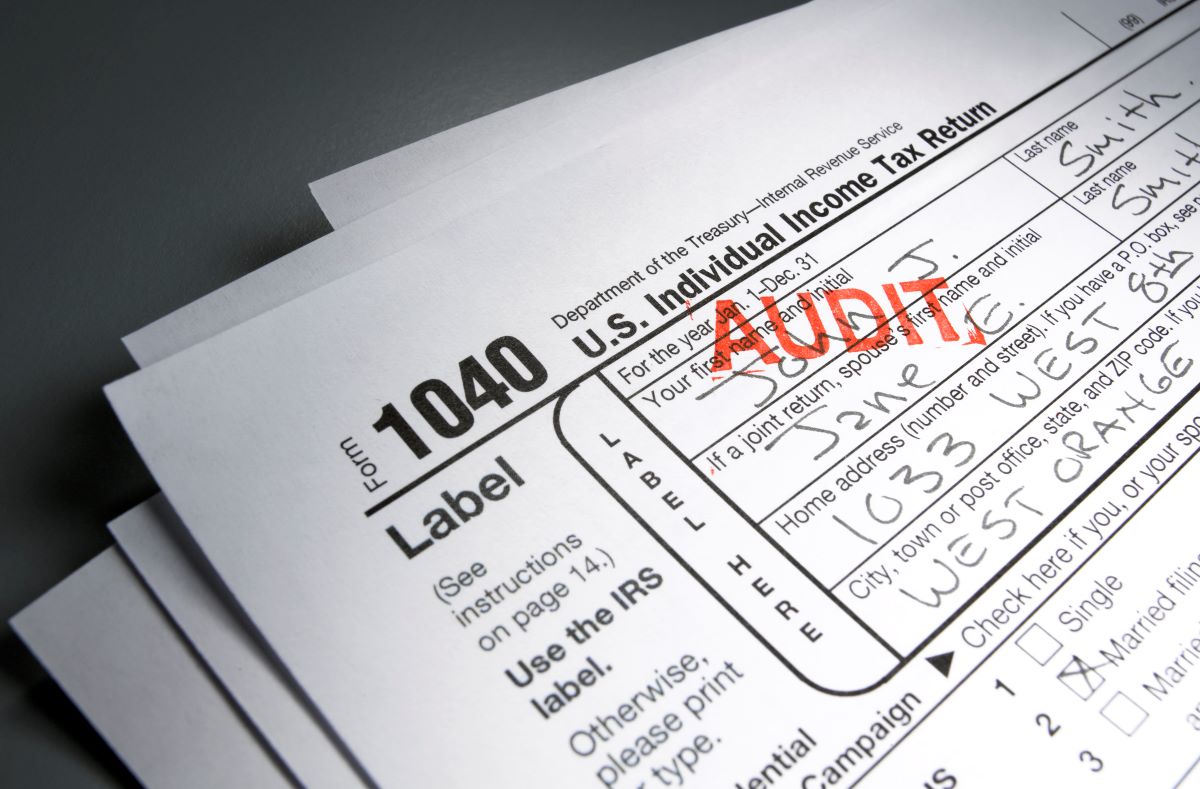

Finance
How Much Does The IRS Make A Year?
Published: October 31, 2023
Discover the financial prowess of the IRS and their annual revenue. Explore how much money the IRS makes each year and gain insights into their financial operations.
(Many of the links in this article redirect to a specific reviewed product. Your purchase of these products through affiliate links helps to generate commission for LiveWell, at no extra cost. Learn more)
Table of Contents
Introduction
The Internal Revenue Service (IRS) is the revenue service of the United States federal government. It is responsible for collecting taxes and enforcing tax laws. The IRS plays a crucial role in funding various government programs and initiatives, including healthcare, education, defense, and infrastructure development. As such, understanding how much revenue the IRS generates each year is essential to comprehend the financial operations of the government.
In this article, we will delve into the topic of how much the IRS makes in a year. We will explore the different sources of IRS revenue, including individual and corporate income taxes, payroll taxes, excise taxes, estate and gift taxes, and other forms of revenue. Additionally, we will discuss the factors that impact the amount of revenue collected by the IRS.
By gaining insights into the revenue collection of the IRS, we can better understand the financial dynamics at play and the significant role taxation plays in the functioning of the United States government. Let’s dive in and explore the fascinating realm of IRS revenue!
Overview of IRS Revenue Collection
The IRS is responsible for collecting revenue on behalf of the United States government. The funds collected by the IRS are crucial for financing government operations, including public services, infrastructure development, and social welfare programs. The annual revenue collected by the IRS is a significant indicator of the financial health and stability of the government.
The IRS revenue collection process involves several steps, including tax return filing, tax assessment, and enforcement of tax laws. The IRS ensures that individuals, corporations, and other entities comply with their tax obligations and pay their fair share. The revenue collected by the IRS is used to cover various expenses, such as public education, national defense, healthcare programs, and social security benefits.
Each year, the IRS generates a substantial amount of revenue, contributing to the overall financial resources of the United States government. The revenue collection by the IRS is influenced by various factors, including economic conditions, changes in tax laws, taxpayer behavior, and government policies.
Let’s explore the different sources of IRS revenue in the following sections, which will provide a comprehensive understanding of how the IRS generates its annual revenue.
Sources of IRS Revenue
The IRS collects revenue from various sources, including individual and corporate income taxes, payroll taxes, excise taxes, estate and gift taxes, and other forms of revenue. Each of these sources contributes to the overall revenue collected by the IRS, ensuring the financial stability of the United States government.
Below, we will delve into the different sources of IRS revenue:
1. Individual Income Tax Revenue
The largest source of revenue for the IRS is individual income taxes. This tax is imposed on the income earned by individuals, including wages, salaries, self-employment earnings, investment gains, and rental income. The IRS collects individual income taxes through an annual filing process, where taxpayers report their income, deductions, and credits on their tax returns.
2. Corporate Income Tax Revenue
Corporations are also subject to taxation on their profits, which are known as corporate income taxes. The IRS collects revenue from corporations based on their taxable income, which is determined by subtracting allowable deductions from their total taxable revenue. Corporate income tax is an important source of revenue for the government, contributing to funding various public programs and initiatives.
3. Payroll Tax Revenue
Payroll taxes are another significant source of revenue for the IRS. Payroll taxes are levied on employers and employees and are used to fund Social Security and Medicare programs. Employers withhold a portion of each employee’s wages for payroll taxes and also contribute their share. These taxes are essential for providing social welfare benefits, such as retirement income and healthcare for elderly and disabled individuals.
4. Excise Tax Revenue
Excise taxes are imposed on specific goods and services, such as gasoline, alcohol, tobacco, and luxury items. The IRS collects revenue from excise taxes, which are incorporated into the prices of these products. Excise taxes serve as a way to regulate and control the consumption of certain goods and provide an additional source of revenue for the government.
5. Estate and Gift Tax Revenue
The estate tax is imposed on the transfer of property upon an individual’s death, while the gift tax is levied on the transfer of property during an individual’s lifetime. The IRS collects revenue from estate and gift taxes, ensuring that significant wealth transfers are subject to taxation. These taxes help to redistribute wealth and fund government programs.
6. Other Sources of IRS Revenue
In addition to the main sources mentioned above, the IRS also generates revenue from various other sources. These may include penalties and interest on late tax payments, fees for various tax-related services, and revenue generated from tax audits and enforcement actions. These additional sources of revenue contribute to the overall funds collected by the IRS.
By diversifying its revenue sources, the IRS ensures a stable and sustainable financial stream for the United States government. The collection and management of these funds are crucial for maintaining the daily operations and fulfilling the financial needs of the government.
Individual Income Tax Revenue
Individual income tax is the largest source of revenue for the IRS, comprising a significant portion of the total funds collected each year. This tax is imposed on the income earned by individuals, including wages, salaries, self-employment earnings, investment gains, and rental income.
The individual income tax collection process involves taxpayers filing their tax returns annually, reporting their income, deductions, and credits. The IRS uses this information to assess the amount of tax owed by the taxpayer. The tax rates for individual income tax are progressive, meaning that higher-income individuals are subject to higher tax rates.
There are various deductions and credits available to taxpayers to reduce their taxable income and lower their tax liability. Common deductions include expenses for mortgage interest, state and local taxes, charitable contributions, and certain medical expenses. Tax credits, such as the child tax credit and the earned income credit, can directly reduce the amount of tax owed.
The IRS utilizes a system of withholding taxes to ensure timely collection of individual income tax. Employers withhold a portion of each employee’s wages and remit it to the IRS on their behalf. This system helps distribute the tax burden throughout the year and avoids a large tax liability at the end of the year.
The individual income tax revenue plays a crucial role in funding government operations and programs. It is used to finance public services, education initiatives, healthcare programs, social security benefits, national defense, and infrastructure development.
The amount of individual income tax revenue collected by the IRS can be influenced by several factors. Economic conditions, such as the overall growth of the economy and the level of employment, can impact individuals’ income levels and, consequently, the amount of tax collected. Changes in tax laws and regulations also affect the amount of revenue collected, as alterations in tax rates or deduction limits can change taxpayers’ tax liabilities.
Taxpayer behavior and compliance also play a significant role in determining individual income tax revenue. The IRS strives to ensure taxpayer compliance through education, enforcement actions, and audits. However, the level of voluntary compliance by taxpayers can vary, which can impact the final amount of revenue collected.
In summary, individual income tax revenue is the largest source of funds for the IRS. It is collected by assessing the income of individuals and applying progressive tax rates. The revenue generated from individual income tax plays a vital role in funding various government initiatives and programs, contributing to the overall financial stability of the United States government.
Corporation Income Tax Revenue
Corporation income tax is an important source of revenue for the IRS, contributing to the overall funds collected each year. This tax is imposed on the profits earned by corporations operating within the United States.
The IRS collects corporation income tax based on the taxable income of the corporation. Taxable income is determined by subtracting allowable deductions from the corporation’s total revenue. Deductions may include business expenses, depreciation of assets, and certain tax credits. The tax rates for corporation income tax are generally flat, meaning that the same tax rate applies to all levels of taxable income.
Corporation income tax plays a significant role in funding government initiatives and public programs. The revenue generated from this tax source is used to finance infrastructure development, national defense, education, healthcare, and various other government operations.
The amount of corporation income tax revenue collected by the IRS can be influenced by multiple factors. Economic conditions, such as the overall profitability of corporations and the level of business activity, can impact the amount of taxable income generated. Changes in tax laws and regulations, including adjustments to tax rates or deductions, can also impact the final tax liability and, consequently, the revenue collected.
It is worth noting that while corporations are subject to taxation on their profits, the actual tax liability can vary due to various factors. Corporations may engage in tax planning strategies to minimize their tax burden legally. These strategies can include the use of deductions, credits, and other tax planning techniques. The IRS has processes in place to monitor and enforce compliance, including audits and the assessment of penalties for non-compliance.
In recent years, there have been discussions and debates surrounding corporate tax reform. Efforts have been made to review and potentially revise the tax code to ensure a fair and efficient taxation system for corporations. These reforms aim to strike a balance between encouraging business growth and investment while ensuring that corporations pay their fair share of taxes.
In summary, corporation income tax is a significant source of revenue for the IRS. It is levied on the profits earned by corporations and contributes to the funding of various government programs and operations. The amount of corporation income tax revenue collected can be influenced by economic conditions, changes in tax laws, and corporate tax planning strategies.
Payroll Tax Revenue
Payroll tax revenue is a critical source of income for the IRS, playing a substantial role in financing social welfare programs such as Social Security and Medicare. These taxes are levied on both employers and employees and are collected based on an individual’s wages or salary.
The payroll tax consists of two main components: the Social Security tax and the Medicare tax. The Social Security tax is used to fund retirement, disability, and survivor benefits, while the Medicare tax supports healthcare coverage for elderly and disabled individuals.
For employees, payroll taxes are withheld from their earnings by their employers and remitted to the IRS. The IRS ensures that employers accurately calculate and withhold the appropriate tax amount based on the employee’s income level and applicable tax rates.
Employers also contribute to payroll taxes on behalf of their employees. In addition to withholding taxes from employee wages, employers are required to pay a matching portion of the Social Security and Medicare taxes.
The revenue generated from payroll taxes is dedicated to funding Social Security and Medicare programs. These programs provide crucial financial support and healthcare coverage to eligible individuals, including retirees, disabled individuals, and those with certain medical conditions.
The amount of payroll tax revenue collected by the IRS is influenced by several factors. Economic conditions and employment rates play a role in determining the total wages subject to payroll taxes. Additionally, changes in tax rates or the wage base limit, which is the maximum amount of earnings subject to Social Security tax, can impact the overall payroll tax revenue.
Ensuring compliance with payroll tax obligations is a priority for the IRS. The agency conducts periodic audits and enforces penalties for non-compliance. It also provides resources and guidance to employers to facilitate accurate reporting and remittance of payroll taxes.
In recent years, there have been discussions regarding potential reforms to the payroll tax system. Some proposals have suggested adjusting the income thresholds or tax rates to ensure the long-term sustainability of programs such as Social Security.
In summary, payroll tax revenue is a significant source of funding for the IRS. It supports Social Security and Medicare programs, providing financial support and healthcare coverage to eligible individuals. The revenue collected from payroll taxes is influenced by economic conditions, employment rates, and potential policy changes aimed at ensuring the equitable and sustainable funding of social welfare programs.
Excise Tax Revenue
Excise tax revenue is an important source of income for the IRS, generated from specific goods and services that are subject to taxation. Excise taxes are imposed on items such as gasoline, alcohol, tobacco, and luxury goods.
The IRS collects excise taxes by incorporating them into the prices of these targeted products. Manufacturers, producers, or importers are typically responsible for paying the excise tax to the IRS, either directly or indirectly. These taxes are often built into the cost of the goods or services and passed on to consumers.
Excise taxes serve multiple purposes. They not only generate revenue for the government but also aim to regulate or discourage the consumption of certain goods. For example, high excise taxes on tobacco products are designed to reduce smoking rates and promote public health. Additionally, excise taxes on gasoline aim to support infrastructure projects and environmental initiatives.
The amount of excise tax revenue collected by the IRS is influenced by various factors. Consumer demand for the taxed goods or services, economic conditions, and changes in tax rates can impact the overall revenue. For example, shifts in consumer preferences towards healthier options could lead to a reduction in revenue from taxed items such as sugary beverages or certain types of alcohol.
Enforcement plays a role in ensuring compliance with excise tax requirements. The IRS monitors industry practices and conducts audits to identify non-compliance. Penalties and fines are imposed on businesses or individuals who fail to comply with excise tax obligations.
It’s important to note that excise taxes are often subject to ongoing discussions and debates. Policy decisions regarding the necessity and effectiveness of certain taxes can influence their rates and scope. Adjustments in tax policies can be made to support specific societal goals or address emerging challenges.
In summary, excise tax revenue is derived from goods and services that are subject to specific taxes. The revenue collected helps fund government programs and initiatives while also regulating consumer behavior. Economic conditions, consumer demand, tax rates, and enforcement efforts all influence the amount of revenue generated from excise taxes.
Estate and Gift Tax Revenue
Estate and gift tax revenue represents an important source of income for the IRS. Estate tax is imposed on the transfer of property upon an individual’s death, while gift tax is levied on transfers of property during an individual’s lifetime.
The IRS collects estate and gift taxes to ensure that significant wealth transfers are subject to taxation. These taxes help to redistribute wealth and fund various government programs and initiatives.
For estate tax, the transfer of property is subject to taxation if the total estate exceeds a certain threshold, known as the exemption amount. The tax is calculated based on the value of the estate, with deductions allowed for certain expenses and debts. In some cases, estates may be subject to state estate taxes in addition to the federal estate tax.
Gift tax, on the other hand, applies to transfers of property during an individual’s lifetime. The IRS imposes the gift tax to prevent individuals from minimizing their estate tax by gifting their assets before death. Certain exemptions and exclusions exist to allow for tax-free gifts up to a certain amount per year or for specific purposes, such as paying for education or medical expenses.
The amount of estate and gift tax revenue collected by the IRS can vary depending on various factors. Economic conditions and fluctuations in asset values can impact the overall value of estates and, consequently, the revenue collected. Changes in tax laws and regulations, such as adjustments to exemption amounts or tax rates, can also influence the tax liability and, consequently, the revenue generated.
The enforcement of estate and gift tax laws is a priority for the IRS. The agency conducts audits and may impose penalties for non-compliance. Additionally, the IRS provides guidance and resources to help individuals navigate their estate and gift tax obligations.
It’s worth noting that estate and gift tax laws can be complex, and tax planning strategies are often employed to minimize the tax burden. Estate planning professionals work with individuals and families to structure their wealth and utilize exemptions and deductions to their advantage.
In summary, estate and gift tax revenue is an important source of income for the IRS. These taxes are imposed on the transfer of property upon an individual’s death or during their lifetime. Economic conditions, tax laws, and tax planning strategies all influence the amount of revenue collected from estate and gift taxes.
Other Sources of IRS Revenue
In addition to individual and corporate income taxes, payroll taxes, excise taxes, and estate and gift taxes, the IRS generates revenue from various other sources. These sources contribute to the overall funds collected by the IRS and play a role in financing government operations and programs.
Here are some of the other sources of IRS revenue:
1. Penalties and Interest
Penalties and interest are assessed on taxpayers who fail to meet their tax obligations or submit their tax payments late. These penalties serve as a deterrent for non-compliance and provide an additional source of revenue for the IRS.
2. User Fees
The IRS charges user fees for various tax-related services, such as requests for copies of tax returns, obtaining tax transcripts, and certain tax-filing options. These fees contribute to the revenue collected by the IRS and help cover administrative costs associated with providing these services.
3. Tax Audits and Enforcement
Tax audits and enforcement actions can result in additional revenue for the IRS. When conducting audits, the IRS may identify tax discrepancies or instances of non-compliance, leading to the assessment of additional taxes, penalties, and interest. Enforcement actions, such as seizing assets or imposing levies, can also generate revenue to fulfill outstanding tax liabilities.
4. Information Sharing
The IRS collects revenue through information sharing agreements with other government agencies and financial institutions. These agreements allow the IRS to access and analyze financial data, identifying potential tax non-compliance and recovering additional funds owed.
5. Offshore Compliance Programs
The IRS has implemented programs to encourage taxpayers with offshore financial accounts to come forward and report their foreign assets. These voluntary disclosure programs offer reduced penalties in exchange for full disclosure and payment of outstanding taxes owed on offshore income and assets.
These other sources of revenue contribute to the overall funds collected by the IRS and support its operations in enforcing tax laws, providing taxpayer services, and funding government programs. While individual and corporate income taxes, along with payroll and excise taxes, are the primary revenue sources, these additional revenue streams add to the financial stability and effectiveness of the IRS.
Total Revenue Collection by the IRS
The Internal Revenue Service (IRS) collects revenue from various sources, including individual and corporate income taxes, payroll taxes, excise taxes, estate and gift taxes, and other forms of revenue. The total revenue collected by the IRS is a significant indicator of the financial health and stability of the United States government.
The exact amount of total revenue collected by the IRS can vary from year to year depending on economic conditions, changes in tax laws, and taxpayer compliance. The revenue collected by the IRS is used to fund government operations, public services, infrastructure development, social welfare programs, and other national priorities.
The largest source of revenue for the IRS is individual income tax. This tax is imposed on the income earned by individuals and contributes a substantial portion to the overall revenue collected. Corporate income tax is another significant source of revenue, generated from taxes on corporate profits.
Payroll tax revenue, collected from both employers and employees, is crucial for funding Social Security and Medicare programs. Excise tax revenue is generated from specific goods and services subject to taxation and serves both as a source of revenue and a means to regulate consumption.
Estate and gift tax revenue contributes to the overall funds collected by the IRS, ensuring that wealth transfers are subject to taxation and potentially redistributing wealth. Additionally, the IRS generates revenue from other sources, such as penalties and interest, user fees, tax audits, enforcement actions, and information sharing agreements.
The total revenue collected by the IRS can be influenced by various factors. Economic conditions, changes in tax laws, taxpayer compliance, and enforcement efforts all impact the final amount. Additionally, tax reforms and adjustments to tax rates or exemption amounts can also affect the revenue collected.
Overall, the total revenue collection by the IRS reflects the financial operations and stability of the United States government. It ensures the funding of essential programs and services, and the IRS plays a critical role in enforcing tax laws and maintaining taxpayer compliance.
Factors Affecting IRS Revenue
The amount of revenue collected by the Internal Revenue Service (IRS) can be influenced by various factors that impact the tax system and taxpayer behavior. Understanding these factors is essential for analyzing trends in revenue collection and developing effective tax policies. Here are some key factors that affect IRS revenue:
1. Economic Conditions
Economic conditions, such as the overall growth of the economy, employment rates, and corporate profits, can significantly impact IRS revenue. During periods of economic expansion, individuals and businesses tend to have higher incomes, leading to increased tax revenues. Conversely, during economic downturns, when incomes decline and job losses occur, tax revenues may decrease.
2. Tax Law Changes
Changes in tax laws and regulations can have a direct impact on IRS revenue. Modifications to tax rates, deductions, exemptions, credits, and other tax provisions can alter the tax liability of individuals and businesses, affecting the amount of revenue collected. Tax reforms implemented by the government or legislative changes can create significant shifts in IRS revenue.
3. Taxpayer Compliance
Voluntary taxpayer compliance is critical for IRS revenue collection. When taxpayers accurately report their income, deductions, and credits and pay their taxes on time, it ensures a steady stream of revenue for the government. The IRS invests in education, outreach, and enforcement efforts to promote compliance and discourage tax evasion.
4. Tax Planning Strategies
Tax planning strategies employed by individuals and businesses can impact IRS revenue. Taxpayers may engage in legal methods to reduce their tax liability, such as legitimate deductions, credits, or structuring their finances to take advantage of favorable tax provisions. Tax planning strategies can result in lower taxable income and, in turn, affect the overall revenue collected by the IRS.
5. Enforcement Actions
The IRS conducts audits, investigations, and enforcement actions to ensure taxpayer compliance. By identifying non-compliance and imposing penalties or fines, the IRS collects additional revenue. Enforcement efforts play a critical role in maintaining the integrity of the tax system and maximizing revenue collection.
6. External Factors
External factors, such as changes in demographics, technological advancements, globalization, and social and political events, can indirectly impact IRS revenue. These factors can influence taxpayer behavior, economic activities, and the overall revenue generated from taxes.
It is important for the IRS and policymakers to monitor and analyze these factors to understand their impact on revenue collection. By considering these influences, the IRS can make informed decisions and implement effective tax policies to ensure a sustainable revenue stream and support the financial needs of the United States government.
Conclusion
The revenue collected by the Internal Revenue Service (IRS) is vital for funding government operations, public services, and social welfare programs. Understanding how the IRS generates its revenue provides valuable insights into the financial dynamics of the United States government.
Through sources such as individual and corporate income taxes, payroll taxes, excise taxes, estate and gift taxes, and other revenue streams, the IRS ensures a stable and consistent flow of funds for the government. Individual income tax revenue, in particular, constitutes a significant portion of the funds collected by the IRS.
Factors such as economic conditions, changes in tax laws, taxpayer compliance, tax planning strategies, enforcement actions, and external influences can all impact the amount of revenue collected by the IRS. These factors require ongoing monitoring and analysis to adapt tax policies and encourage voluntary compliance, while also ensuring that tax laws remain fair and effective.
In conclusion, the revenue collection by the IRS is a complex and dynamic process. It serves as a crucial mechanism for the government to fulfill its obligations, provide public services, and address the needs of its citizens. By understanding the sources of IRS revenue and the factors that influence it, policymakers can make informed decisions to support the stability and sustainability of the United States government’s fiscal operations.














